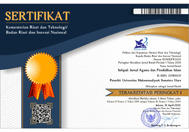Implementation Of Affective Learning Assessment At MA Al-Mahdi Pabuaran
Abstract
Affective learning assessment becomes an important element in the educational process to understand and promote the emotional and social development of students. This study aims to analyze the implementation of affective learning assessment in MA Al-Mahdi Pabuaran through a qualitative approach. Qualitative research methods are used to explore the perceptions and experiences of teachers and students regarding the affective assessment process in the educational environment. By collecting data through in-depth interviews, observation, and document analysis, this study evaluated the effectiveness of affective assessment methods applied in schools. This study aims to analyze the implementation of affective learning assessment in MA Al-Mahdi Pabuaran through a qualitative approach. The results of this study show that affective assessment is beneficial for the development of student behavior towards a better direction and provides deeper insight into effective strategies in assessing students' affective aspects and provides recommendations for improving affective assessment practices in similar educational institutions. In this study, it can be seen that the implementation of affective learning assessment at MA Al-Mahdi Pabuaran has been carried out as it should. This can be seen from the application of several steps in the implementation of affective assessment at MA Al-Mahdi Pabuaran such as learning planning, application of Affective Assessment instruments, Implementation of Observations, assessment and scores and Implementation of Learning Process Evaluation. Thus, this research is expected to make an important contribution to the development of a more holistic and sustainable affective assessment approach in Islamic educational institutions.
Keywords
Full Text:
PDFReferences
Davies, & Kevin, I. (1976). Objectives In Curriculum Design. Maidenhead: McgrawHill.
Djaali, H., & Muljono, P. (2008). Pengukuran Dalam Bidang Pendidikan. Jakarta: Grasindo.
Husamah, Setyaningrum, & Yanur. (2013). Desain Pembelajaran Berbasis Pencapaian Kompetensi Panduan Merancang Pembelajaran Untuk Mendukung Impementasi Kurikulum 2013. Jakarta: Prestasi Pustaka.
Jeanny Indrastoeti, Ismail, Y. (2015). Penyusunan Instrumen Penilaian Ranah Afektif Berbasis Kurikulum 2013 Sekolah Dasar (Vol. 4, Issue 1, p. vol.4, No.1). https://jurnal.uns.ac.id/jurnal-semar/article/download/800/782
Krathwohl, Bloom, & Masia. (1964). Taxonomy Of Educational Objectives Book 2 Affective Domain. New York: Longman Inc.
Kunandar. (2014). Penilaian Autentik (Penilaian Hasil Belajar Peserta Didik Berdasarkan Kurikulum 2013) Suatu Pendekatan Praktis Edisi Revisi. Jakarta: PT Raja grafindo Persada.
Kusumawati, T. (2015). Pengembangan Instrumen Penilaian (Development of Assessment Instrument). Jurnal SMaRT, 01(Mi), 111–123.
Saftari, M., & Fajriah, N. (2019). Penilaian Ranah Afektif Dalam Bentuk Penilaian Skala Sikap Untuk Menilai Hasil Belajar. Edutainment : Jurnal Ilmu Pendidikan Dan Kependidikan, 7(1), 71–81. https://doi.org/10.35438/e.v7i1.164
Sudjana, & Nana. (2009). Penilaian Hasil Proses Belajar Mengajar. Bandung: PT Remaja Rosdakarya.
Uno, & Koni. (2012). Assessmen Pembelajaran. Jakarta: Bumi Aksara.
Zakaria, & Ramli. (2006). Pedoman Penilaian Sikap Dalam (Classroom Based Assessment). Jakarta: Pusat Penilaian Pendidikan.
DOI: https://doi.org/10.30596/17201
Refbacks
- There are currently no refbacks.
Intiqad Jurnal Agama dan Pendidikan Islam is abstracting & indexing in the following databases:
View My StatsEditorial Address:
Faculty of Islamic Religion, Universitas Muhammadiyah Sumatera Utara. Jl. Mukhtar Basri No. 3 Medan 20238 Telp. (061) 6622400 ext. 27 dan 28 Fax. (061) 6625474. e-mail: intiqad@umsu.ac.id

_(1).png)























